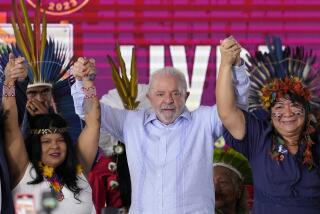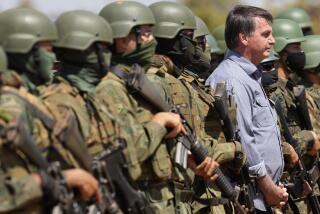Democracy in Zambia May Be Slipping, Some Observers Fear
- Share via
NAIROBI, Kenya — A series of recent authoritarian actions by the government of Zambian President Frederick Chiluba is sending disturbing signals that the country, traditionally a bulwark of stability in southern Africa, may be returning to a system of repressive autocracy.
The recent jailing without charge of former President Kenneth D. Kaunda, and his subsequent release and confinement under house arrest this week, caps several months of political skirmishes, including an apparent assassination attempt against Kaunda and an unsuccessful coup.
Although analysts agree that events do not yet warrant concern that Zambia could be descending into the kind of civil strife that has ravaged several other African nations, it is clear that the country’s political foundations are becoming increasingly shaky.
“You really do have a very strong democratic institution here,” a diplomatic source said. “But what is alarming in the last few months is the strong evidence that this might be slipping.”
Chiluba’s promises of democracy and a free-market economy were eagerly embraced when he was elected in 1991, ending the 27-year rule of Kaunda, who had led Zambia to independence from Britain in 1964.
But doubts about Chiluba’s commitment to fairness were raised after he introduced legislation that barred Kaunda from participating in the 1996 presidential race--which Chiluba subsequently won. Last year, Kaunda was slightly wounded by a bullet that many observers say was meant to kill him.
Analysts say that when a group of junior military officers tried to oust Chiluba in October, he had the chance to capitalize on the widespread public disapproval of the coup attempt by showing that the government was still bent on adhering to democratic principles.
Instead, he stepped up repressive measures and jailed 90 suspects--mainly military officers, who have not been formally charged. The 73-year-old Kaunda, who was out of the country during the failed putsch, was also arrested on suspicion of involvement in the coup attempt.
Government officials defend the move. “The country was seriously traumatized by the coup,” argued Richard Sakaka, Chiluba’s special assistant. “If it had succeeded, this country would have been seriously dislocated. People should not lose sight of the fact that this was a criminal offense.”
But observers say Chiluba’s intense reaction to challenges to his authority indicates that he is copying other leaders in the region--such as Kenyan President Daniel Arap Moi and Congolese President Laurent Kabila--who appear to crack down on dissenters not just to maintain order but to ensure their political advantage.
“Since the last election, things have been moving in a more ominous direction in Zambia,” said Adotei Akwei of the human rights group Amnesty International. “[Chiluba’s] government has, unfortunately, seen the model of very strong African leaders in the region . . . and has said that this is what we have to do to be among this new level of leadership.”
*
Kaunda’s supporters say the veteran statesman’s house arrest is worse than jail because of the conditions that have been imposed.
Phone service to his home has been cut; all relatives, except Kaunda’s wife, have been ordered to leave the home; no one is allowed within 100 yards of the property; and Kaunda has been banned from political activities and from talking to the media.
“The government lives in great fear of Dr. Kaunda,” said Tiyaonse Kabwe, a senior official in the Kaunda camp. “They feel threatened, because they look at him as the only other person who can challenge them and defeat them.”
But while Kaunda is revered as an elder statesman, his level of support remains unclear. Most Zambia poll-watchers agree that even if he had run in the November 1996 election last year, he probably would not have won.
More to Read
Sign up for Essential California
The most important California stories and recommendations in your inbox every morning.
You may occasionally receive promotional content from the Los Angeles Times.











